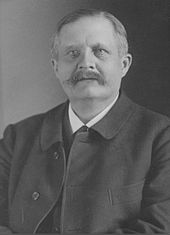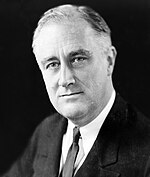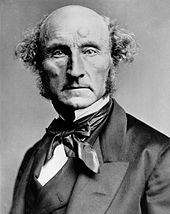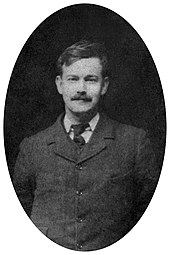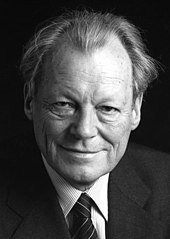Social liberalism (German: Sozialliberalismus, Spanish: socioliberalismo), also known as new liberalism in the United Kingdom, modern liberalism in the United States, left liberalism (German: Linksliberalismus) in Germany and progressive liberalism (Spanish: Liberalismo progresista) in Spanish-speaking countries, is a political philosophy and variety of liberalism that endorses a social market economy within an individualist economy and the expansion of civil and political rights. Under social liberalism, the common good is viewed as harmonious with the freedom of the individual.
Social liberal policies have been widely adopted in much of the world. Social liberal ideas and parties tend to be considered centrist or centre-left. A social liberal government is expected to address economic and social issues such as poverty, welfare, infrastructure, health care, education and the climate using government intervention whilst also emphasizing the rights and autonomy of the individual.
In the United States, the term social liberalism may sometimes refer to progressive stances on sociocultural issues such as reproductive rights and same-sex marriage (in contrast with social conservatism). Because cultural liberalism expresses the social dimension of liberalism, it is often referred to as social liberalism, although it is not the same as the broader political ideology known as social liberalism. An American social liberal in this sense may hold either conservative (economic liberal) or modern liberal (economic progressive) views on fiscal policy.
Origins
United Kingdom
By the end of the 19th century, the principles of classical liberalism were challenged by downturns in economic growth, a growing awareness of poverty and unemployment present within modern industrial cities and also by the agitation of organised labour. A major political reaction against the changes introduced by industrialisation and laissez-faire capitalism came from one-nation conservatives concerned about social balance and the introduction of the famous Education Act 1870, although socialism later became a more important force for change and reform. Some Victorian writers—including Charles Dickens, Thomas Carlyle and Matthew Arnold—became early influential critics of social injustice.
John Stuart Mill contributed enormously to liberal thought by combining elements of classical liberalism with what eventually became known as the new liberalism. The new liberals tried to adapt the old language of liberalism to confront these difficult circumstances, which they believed could only be resolved through a broader and more interventionist conception of the state. An equal right to liberty could not be established merely by ensuring that individuals did not physically interfere with each other or merely by having laws that were impartially formulated and applied, as more positive and proactive measures were required to ensure that every individual would have an equal opportunity of success.
New Liberals
In the late 19th century and early 20th century, a group of British thinkers known as the New Liberals made a case against laissez-faire classical liberalism and argued in favor of state intervention in social, economic and cultural life. What they proposed is now called social liberalism. The New Liberals, including intellectuals like Thomas Hill Green, Leonard Hobhouse and John A. Hobson, saw individual liberty as something achievable only under favorable social and economic circumstances. In their view, the poverty, squalor and ignorance in which many people lived made it impossible for freedom and individuality to flourish. New Liberals believed that these conditions could be ameliorated only through collective action coordinated by a strong, welfare-oriented and interventionist state.
The Liberal governments of Henry Campbell-Bannerman and H. H. Asquith, especially thanks to Chancellor of the Exchequer and later Prime Minister David Lloyd George, established the foundations of the welfare state in the United Kingdom before World War I. The comprehensive welfare state built in the United Kingdom after World War II, although largely accomplished by the Labour Party's Attlee ministry, was significantly designed by two Liberals, namely John Maynard Keynes (who laid the foundations in economics with the Keynesian Revolution) and William Beveridge (whose Beveridge Report was used to design the welfare system).
Historian Peter Weiler has argued:
Although still partially informed by older Liberal concerns for character, self-reliance, and the capitalist market, this legislation nevertheless marked a significant shift in Liberal approaches to the state and social reform, approaches that later governments would slowly expand and that would grow into the welfare state after the Second World War. What was new in these reforms was the underlying assumption that the state could be a positive force, that the measure of individual freedom [...] was not how much the state left people alone, but whether he gave them the capacity to fill themselves as individuals.
Germany
In 1860s Germany, left-liberal politicians like Max Hirsch, Franz Duncker and Hermann Schulze-Delitzsch established trade unions—modeled on their British counterparts—in order to help workers improve working and economic conditions by means of reconciliation of interests and cooperation with their employers rather than class struggle. Schulze-Delitzsch is also known as the founding father of the German cooperative movement and is credited as the organiser of the world's first credit unions. Some liberal economists, such as Lujo Brentano or Gerhart von Schulze-Gävernitz, established the Verein für Socialpolitik (German Economic Association) in 1873 to promote social reform based on the historical school of economics and therefore rejecting classical economics, proposing a third way between Manchester Liberalism and socialist revolution in the 1871-founded German Empire.
However, the German left-liberal movement fragmented itself into wings and new parties over the 19th century. The main objectives of the left-liberal parties—the German Progress Party and its successors—were free speech, freedom of assembly, representative government, secret and equal but obligation tied suffrage, protection of private property while they were strongly opposed to the creation of a welfare state, which they called state socialism. The main differences between the left-liberal parties were the national ambitions, the different substate people's goals, free trade against Schutzzollpolitik, and the building of the national economy.
The term "social liberalism" (German: Sozialliberalismus) was used first in 1891 by Austrian economist and journalist Theodor Hertzka. Subsequently, in 1893, the historian and social reformer Ignaz Jastrow also used this term, and joined the German Economic Association. He published the socialist democratic manifesto "Social-liberal: Tasks for Liberalism in Prussia" to create an "action group" for general people's welfare in the Social Democratic Party of Germany, which they rejected.
The National-Social Association founded by the Protestant pastor Friedrich Naumann also maintained contacts with the left-liberals. He tried to draw workers away from Marxism by proposing a mix of nationalism and a Protestant-Christian-value-inflected social liberalism to overcome class antagonisms by non-revolutionary means. Naumann called this a "proletarian-bourgeois integral liberalism". Although the party was unable to win any seats and soon dissolved, he remained influential in theoretical German left liberalism.
In the Weimar Republic, the German Democratic Party was founded and came into an inheritance of the left-liberal past and had a leftist social wing, and a rightist economic wing but heavily favored the democratic constitution over a monarchist one. Its ideas of a socially balanced economy with solidarity, duty and rights among all workers struggled due to the economic sanctions of the Treaty of Versailles, but it influenced local cooperative enterprises.
After 1945, the Free Democrats included most of the social liberals while others joined the Christian Democratic Union of Germany. Until the 1960s, post-war ordoliberalism was the model for Germany. It had theoretical influence of social liberalism based on duty and rights. As the Free Democrats discarded social liberal ideas in favour of more conservative and economical liberal approach in 1982, some members left the party and formed the social liberal Liberal Democrats.
France
In France, social-liberal theory was developed in the Third Republic by solidarist thinkers, including Alfred Fouillée and Émile Durkheim, who were inspired by sociology and influenced radical politicians like Léon Bourgeois. They explained that a greater division of labor caused greater opportunity and individualism, but it also inspired a more complex interdependence. They argued that the individual had a debt to society, promoting progressive taxation to support public works and welfare schemes. However, they wanted the state to coordinate rather than to manage and they encouraged cooperative insurance schemes among individuals. Their main objective was to remove barriers to social mobility rather than create a welfare state.
United States
In the United States, the term social liberalism was used to differentiate it from classical liberalism or laissez-faire, which dominated political and economic thought for a number of years until the term branched off from it around the Great Depression and the New Deal. In the 1870s and the 1880s, the American economists Richard Ely, John Bates Clark and Henry Carter Adams—influenced both by socialism and the Evangelical Protestant movement—castigated the conditions caused by industrial factories and expressed sympathy towards labor unions. However, none developed a systematic political philosophy and they later abandoned their flirtations with socialist thinking. In 1883, Lester Frank Ward published the two-volume Dynamic Sociology and formalized the basic tenets of social liberalism while at the same time attacking the laissez-faire policies advocated by Herbert Spencer and William Graham Sumner. The historian Henry Steele Commager ranked Ward alongside William James, John Dewey and Oliver Wendell Holmes Jr. and called him the father of the modern welfare state. Writing from 1884 until the 1930s, John Dewey—an educator influenced by Hobhouse, Green and Ward—advocated socialist methods to achieve liberal goals. Some social liberal ideas were later incorporated into the New Deal, which developed as a response to the Great Depression when Franklin D. Roosevelt came into office.
Implementation
The welfare state grew gradually and unevenly from the late 19th century, but became fully developed following World War II along with the mixed market economy. Also called embedded liberalism, social liberal policies gained broad support across the political spectrum, because they reduced the disruptive and polarizing tendencies in society, without challenging the capitalist economic system. Business accepted social liberalism in the face of widespread dissatisfaction with the boom and bust cycle of the earlier economic system as it seemed to them to be a lesser evil than more left-wing modes of government. Social liberalism was characterized by cooperation between big business, government and labor unions. Government was able to assume a strong role because its power had been strengthened by the wartime economy, but the extent to which this occurred varied considerably among Western democracies.
United Kingdom
The first notable implementation of social liberal policies occurred under the Liberal Party in Britain from 1906 until 1914. These initiatives became known as the Liberal welfare reforms. The main elements included pensions for poor elderly people, health, sickness and unemployment insurance. These changes were accompanied by progressive taxation, particularly in the People's Budget of 1909. The old system of charity relying on the Poor Laws and supplemented by private charity, public co-operatives and private insurance companies was in crisis, giving the state added impetus for reform. The Liberal Party caucus elected in 1906 also contained more professionals, including academics and journalists, sympathetic to social liberalism. The large business owners had mostly deserted the Liberals for the Conservatives, the latter becoming the favorite party for commercial interests. The reforms were regularly opposed by both business interests and trade unions. Liberals most identified with these reforms were Prime Minister H. H. Asquith, John Maynard Keynes, David Lloyd George (especially as Chancellor of the Exchequer) and Winston Churchill (as President of the Board of Trade) in addition to the civil servant (and later Liberal MP) William Beveridge.
Most of the social democratic parties in Europe (notably including the British Labour Party) have taken on strong influences of social liberal ideology. Despite Britain's two major parties coming from the traditions of socialism and conservatism, most substantive political and economic debates of recent times were between social liberal and classical liberal concepts.
Germany
Alexander Rüstow, a German economist, first proposed the German variant of economic social liberalism. In 1932, he applied the label neoliberalism to this kind of social liberalism while speaking at the Social Policy Association, although that term now carries a meaning different from the one proposed by Rüstow. Rüstow wanted an alternative to socialism and to the classical liberal economics developed in the German Empire. In 1938, Rüstow met with a variety of economic thinkers—including the likes of Ludwig Mises, Friedrich Hayek and Wilhelm Röpke—to determine how liberalism could be renewed. Rüstow advocated a strong state to enforce free markets and state intervention to correct market failures. However, Mises argued that monopolies and cartels operated because of state intervention and protectionism and claimed that the only legitimate role for the state was to abolish barriers to market entry. He viewed Rüstow's proposals as negating market freedom and saw them as similar to socialism.
Following World War II, Rüstow's neoliberalism, now usually called ordoliberalism or the social market economy, was adopted by the West German government under Ludwig Erhard, who was the Minister of Economics and later became Chancellor. Price controls were lifted and free markets were introduced. While these policies are credited with Germany's post-war economic recovery, the welfare state—which had been established under Bismarck—became increasingly costly.
Turkey
Kemalist Economic Model was designed by Mustafa Kemal Atatürk, founder of the Republic of Turkey. His economic model can be summarized as "solidarist liberal economy". Atatürk put the principle of "statism" in his Six Arrows and explained this principle as follows:
"State can't take the place of individuals, but, it must take into consideration the individuals to make them improve and develop theirselves. Etatism includes the work that individuals won't do because they can't make profit or the work which are necessary for national interests. Just as it is the duty of the state to protect the freedom and independence of the country and to regulate internal affairs, the state must take care of the education and health of its citizens. The state must take care of the roads, railways, telegraphs, telephones, animals of the country, all kinds of vehicles and the general wealth of the nation to protect the peace and security of the country. During the administration and protection of the country, the things we just counted are more important than cannons, rifles and all kinds of weapons. (...) Private interests are generally the opposite of the general interests. Also, private interests are based on rivalries. But, you can't create a stable economy only with this. People who think like that are delusional and they will be a failure. (...) And, work of an individual must stay as the main basis of economic growth. Not preventing an individual's work and not obstructing the individual's freedom and enterprise with the state's own activities is the main basis of the principle of democracy."
Moreover, Atatürk said this at his opening speech in November 1, 1937: "Unless there is an absolute necessity, the markets can't be intervened; also, no markets can be completely free."
Also he said that the principle of statism is a special economic system for Turkey, and said that it's different from socialism, communism and collectivism.
As we can understand from his words, Atatürk's statism is a social liberal economic system.
Rest of Europe
The post-war governments of other countries in Western Europe also followed social liberal policies. These policies were implemented primarily by Christian democrats and social democrats as liberal parties in Europe declined in strength from their peak in the 19th century.
United States
American political discourse resisted this social turn in European liberalism. While the economic policies of the New Deal appeared Keynesian, there was no revision of liberal theory in favor of greater state initiative. Even though the United States lacked an effective socialist movement, New Deal policies often appeared radical and were attacked by the right. The separate development of modern liberalism in the United States is often attributed to American exceptionalism, which kept mainstream American ideology within a narrow range.
John Rawls' principal work A Theory of Justice (1971) can be considered a flagship exposition of social liberal thinking, advocating the combination of individual freedom and a fairer distribution of resources. According to Rawls, every individual should be allowed to choose and pursue his or her own conception of what is desirable in life, while a socially just distribution of goods must be maintained. Rawls argued that differences in material wealth are tolerable if general economic growth and wealth also benefit the poorest. A Theory of Justice countered utilitarian thinking in the tradition of Jeremy Bentham, instead following the Kantian concept of a social contract, picturing society as a mutual agreement between rational citizens, producing rights and duties as well as establishing and defining roles and tasks of the state. Rawls put the equal liberty principle in the first place, providing every person with equal access to the same set of fundamental liberties, followed by the fair equality of opportunity and difference principle, thus allowing social and economic inequalities under the precondition that privileged positions are accessible to everyone, that everyone has equal opportunities and that even the least advantaged members of society benefit from this framework. This was later restated in the equation of Justice as Fairness. Rawls proposed these principles not just to adherents of liberalism, but as a basis for all democratic politics, regardless of ideology. The work advanced social liberal ideas immensely within the 1970s political and philosophic academia. Rawls may therefore be seen as a "patron saint" of social liberalism.
Decline
Following economic problems in the 1970s, liberal thought underwent some transformation. Keynesian economic management was seen as interfering with the free market, while increased welfare spending that had been funded by higher taxes prompted fears of lower investment, lower consumer spending and the creation of a "dependency culture". Trade unions often caused high wages and industrial disruption while full employment was regarded as unsustainable. Writers such as Milton Friedman and Samuel Brittan, who were influenced by Friedrich Hayek, advocated a reversal of social liberalism. Their policies—which are often called neoliberalism—had a significant influence on Western politics, most notably on the governments of United Kingdom Prime Minister Margaret Thatcher and the United States President Ronald Reagan, who pursued policies of deregulation of the economy and reduction in spending on social services.
Part of the reason for the collapse of the social liberal coalition was a challenge in the 1970s from financial interests that could operate independently of national governments. Another cause was the decline of organized labor which had formed part of the coalition but was also a support for left-wing ideologies challenging the liberal consensus. Related to this was the decline of working-class consciousness and the growth of the middle class. The push by the United States which had been least accepting of social liberalism for trade liberalization further eroded support.
Contemporary revival of social liberal thought
From the end of the 20th century, at the same time that it was losing political influence, social liberalism experienced an intellectual revival with a number of important authors, including John Rawls (political philosophy), Amartya Sen (philosophy and economy), Ronald Dworkin (philosophy of law), Martha Nussbaum (philosophy), Bruce Ackerman (constitutional law), and others.
Parties and organisations
In Europe, social liberal parties tend to be small or medium-sized centrist and centre-left parties. Examples of successful European social liberal parties which have participated in government coalitions at national or regional levels include the Liberal Democrats in the United Kingdom, the Democrats 66 in the Netherlands, and the Danish Social Liberal Party. In continental European politics, social liberal parties are integrated in the Renew Europe group in the European Parliament which is the third biggest group at the parliament and includes social liberal parties, market liberal parties and centrist parties. Other groups such as the European People's Party, the Greens–European Free Alliance and the Progressive Alliance of Socialists and Democrats also house some political parties with social-liberal factions.
Giving an exhaustive list of social liberal parties worldwide is difficult, largely because political organisations are not always ideologically pure and party ideologies often change over time. However, the following parties and organisations are usually accepted by peers such as the Africa Liberal Network, the Alliance of Liberals and Democrats for Europe Party, the Council of Asian Liberals and Democrats, the European Liberal Forum, the Liberal International and the Liberal Network for Latin America or scholars as following social liberalism as a core ideology.


